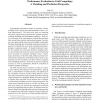Free Online Productivity Tools
i2Speak
i2Symbol
i2OCR
iTex2Img
iWeb2Print
iWeb2Shot
i2Type
iPdf2Split
iPdf2Merge
i2Bopomofo
i2Arabic
i2Style
i2Image
i2PDF
iLatex2Rtf
Sci2ools
157
click to vote
CCGRID
2007
IEEE
2007
IEEE
Performance Evaluation in Grid Computing: A Modeling and Prediction Perspective
Experimental performance studies on computer systems, including Grids, require deep understandings on their workload characteristics. The need arises from two important and closely related topics in performance evaluation, namely, workload modeling and performance prediction. Both topics rely heavily on the representative workload data and have their arsenal from statistics and machine learning. Nevertheless, their goals and the nature of research differ considerably. Workload modeling aims at building mathematical models to generate workloads that can be used in simulation-based performance evaluation studies. It should statistically resemble the original real-world data therefore marginal statistics and second-order properties such as autocorrelation and power spectrum are important matching criteria. Performance prediction, on the other hand, intends to provide realtime forecast of important performance metrics (such as application run time and queue wait time) which can support Gr...
Related Content
| Added | 02 Jun 2010 |
| Updated | 02 Jun 2010 |
| Type | Conference |
| Year | 2007 |
| Where | CCGRID |
| Authors | Hui Li |
Comments (0)

